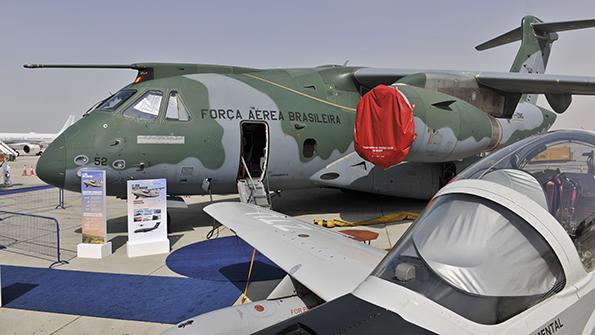
Embraer has decided to fight a proposed cut of nearly half the KC-390s on order by the Brazilian Air Force, even as studies have stalled for future development projects of hybrid-electric transports and jet-powered unmanned aircraft systems (UAS) by its primary military funding partner of 52 years.
The disputed funding cut would reduce the initial batch of twin-engine tanker-transports ordered in 2014 by the Brazilian Air Force to 15 from 28, a 46% reduction.
- Dispute heads to Brazilian courts
- COVID-19's impact curbs buying power
The raw numbers, however, mask the shock of the impact of the unprecedented legal conflict between the two organizations. A local air force requirement for a military transport led to the creation of Embraer in 1969. The Brazilian government privatized Embraer in 1994, but the company’s military division continued to function as a profitable armory for the national air force. About 70% of the Brazilian Air Force fleet has passed through Embraer factories, including A-29 light attack fighters, R-99 and P-99 surveillance aircraft and the first four KC-390s.
But the economic havoc wreaked by the COVID-19 pandemic has curbed national resources, Air Lt. Brig. Carlos de Almeida Baptista, the Brazilian Air Force commander, said in a statement posted on the organization’s website on Nov. 12.
Baptista said he contacted Embraer on April 23 to start negotiations on a significant cut to the original order for 28 aircraft. In a June interview with a Brazilian newspaper, Baptista said the talks covered a range of cuts of between 12 and 17 aircraft. But Brazilian law allows public agencies to adjust unilaterally the value of signed contracts by no more than 25%, so the air force was required to negotiate with Embraer.
The talks were scheduled to conclude by August but dragged on for three more months without a solution, Baptista said. Since his budget covers only 50% of the KC-390 program costs this year, Baptista said he was forced to make a unilateral cut of 46% of the overall order.
Embraer does not acknowledge the 46% reduction, saying in a statement released to shareholders that it intends to “seek legal measures” in response to the unilateral spending change that exceeds 25%.
If the Brazilian Air Force’s 13-aircraft cut is upheld, Embraer’s overall orders for the KC-390 would decline to 22 aircraft: 15 from Brazil, five from Portugal and two from Hungary. In the same interview in June, however, Baptista said the air force needs 28 KC-390s and would order the remainder in follow-on batches if the government’s finances improve. The company also signed a letter of intent with Skytech for up to six commercial variants in 2018.
So far, KC-390 orders have been slow, but several prospects remain. In the Middle East and North African region alone, Saudi Arabia and Egypt are expected to replace aging C-130s. Brazilian President Jair Bolsonaro joined the sales push at the Dubai Airshow, offering local dignitaries a personal tour of a KC-390 parked in the static display.
“We cannot give specific information about sales campaigns, but we have had meaningful conversations with several countries around the world, which includes nations in the Middle East,” Jackson Schneider, president of Embraer’s Defense and Security business, tells Aviation Week.
But Embraer cannot expect immediate help from two development studies launched in partnership with the Brazilian Air Force last year. A fast, jet-powered UAS concept has not progressed beyond initial studies, Schneider says. A proposal for a hybrid-electric military transport to replace the Brazilian Air Force’s C-95s and C-97s also remains in early studies.
As the Brazilian Air Force faces a fiscal crisis, Embraer is seeking new partners for financial support with future military projects. Recalling the collaboration with Italy in the 1980s that led to the Embraer-Aermacchi A-1 AMX fighter-trainer, Brazil is again seeking help from abroad.
“We are looking to establish long-term partnerships with our customers, which sometimes can even lead to new developments with these new countries and customers,” Schneider says.

